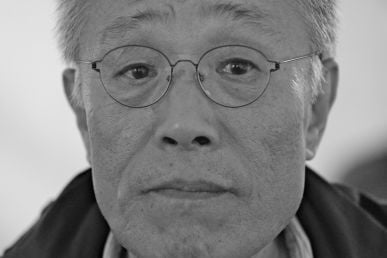
Hwang Sok-Yong
- South Korean
- Zu Gast beim ilb: 2014
Hwang Sok-yong was born in 1943 in Zhangchun in Manchuria, where his middle class family had found refuge after fleeing from the Japanese colonial forces. Between 1945, the year when the Japanese occupation ended, and 1948, when the country became communist, he lived in North Korea. The family then fled to Seoul. In 1978, Hwang Sok-yong moved to Gwangju in the south west, where he experienced the 1980 uprising against the miitary dictatorship, living periodically on the island of Jeju. In 1989, he travelled for the first time to North Korea at the invitation of the Association of Literature and Art and, the following year, attended the »Versammlung aller Völker« (Gathering of the Peoples) there. The »realistic idealist« Hwang Sok-yong campaigns tirelessly for reconciliation between the two partial states. He spent several years in exile, among these 1989/90, in Berlin. Returning home from New York in 1993, he was sentenced to seven years in prison because of his trip to North Korea. He was released in 1998 as part of an amnesty issued under the new »Sunshine Policy« propagated by State President Kim Dae-jung, sent afterwards as a special cultural envoy to North Korea.
While at school, Hwang was given a prize for his first short story, and his first publication was released in1962. His work is marked by politically-related transitions in life of a tragic nature that are presented without any irony whatsoever. Two of his books have been translated into German, »Die Geschichte des Herrn Han« (tr. The Story of Mr Han) and »Der ferne Garten« (tr. The Distant Garden). In both stories, the heroes are broken by imprisonment for crimes they did not commit. In »Die Geschichte des Herrn Han« (1972) Hwang, who did his national service in Vietnam from 1966 to 1969, describes in form of a simple chronicle the fate of Han Yondok, a professor of gynaecology at the university hospital in Pyongyang. The straightforward Han becomes embroiled in the turmoil of the Korean War. When he secretly cares for a patient outside of the privileged hospital ward reserved for the Party, he is sentenced to death, but is able to escape. »Ready to leave behind their possessions, their homeland, their soil, even their souls just to be able to live somewhere in peace«, the Han family tries to cross the ice-cold Daedong river in December heading south, but only the father survives. In Seoul, he is then denounced as a North Korean spy, interned and tortured. The dramatic scenes of flight and separation by the Daedong River are symbolically characteristic of all Korean literature as a whole. In 1984, his ten-volume novel »Jang Gilsan« was released after being printed over a period of ten years in the »Hanguk-Ilbo« newspaper. Hwang’s own experience with the fall of the Berlin Wall provides the climax of his expansive social and love story »Der ferne Garten« (2000), parts of which take place in Berlin.
The author, who is one of Korea’s most famous writers, has received numerous awards including the Daesan Prize and the Korea Arts & Culture Literature Prize. Hwang Sok-yong is currently living in London.
Der ferne Garten dtv premium München, 2000 [Ü: Oh Dong-sik, Kang Seung-hee u. Torsten Zaiak]
Die Geschichte des Herrn Han dtv premiumMünchen, 2005 [Ü: Oh Dong-sik, Kang Seung-hee u. Torsten Zaiak]
Der Gast dtv premiumMünchen, 2007 [Ü: Young Lie, Katrin Mensing u. Matthias Augustin]
Unkraut und andere Prosa Delta Stuttgart, 2011 [Ü: Kang Seeun-hee, Oh Dong-sik, Torsten Zaiak u. Martin Tutsch]
The Shadow of Arms Seven Stories New York, 2014 [Ü: Chun Kyung-ja]
